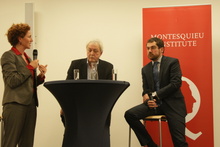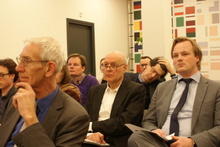
“The crisis we experience in the eurozone has nothing to do with the lack of social convergence … Some may say: in order to avoid future crisis in the eurozone, social convergence is needed. I say this is not needed at all,” De Grauwe said. Guy Verhofstadt, leader of the European Parliament’s liberal ALDE group, said that the inability to devaluate national currencies in the eurozone requires countries to engage in another type of reform that should be done at European level, in the economic, fiscal and social fields. However, such a policy does not exist, he admitted. Unlike the USA or Japan where the central banks foster the market’s confidence, the common EU currency has “nothing behind it”, Verhofstadt said. This is why the only response brought so far was introducing discipline, he said. The lower the EU budget is, the more convergence is needed, with minimum values to prevent social dumping and maximum values to guarantee the competiveness of the economy, he said.

